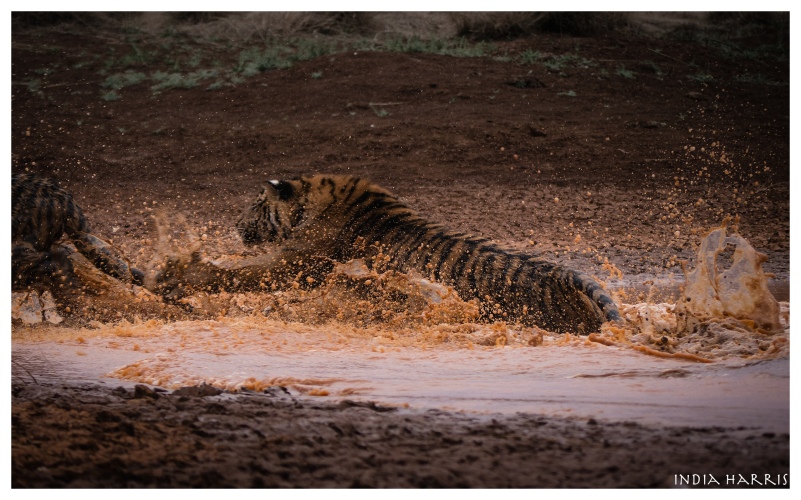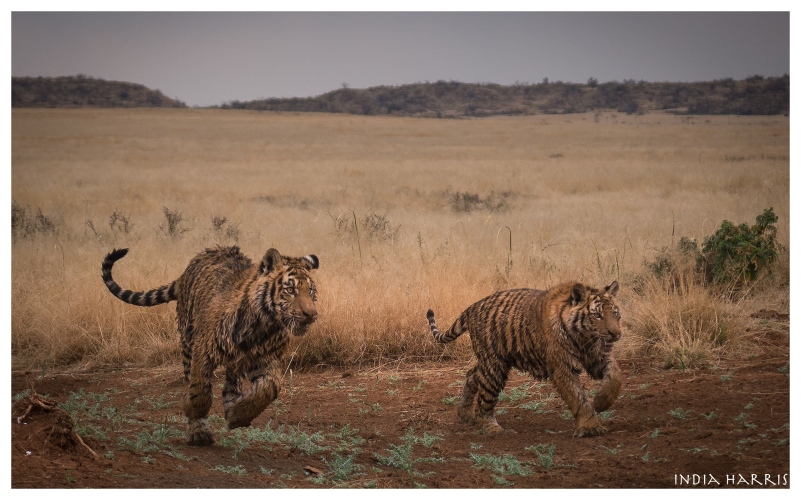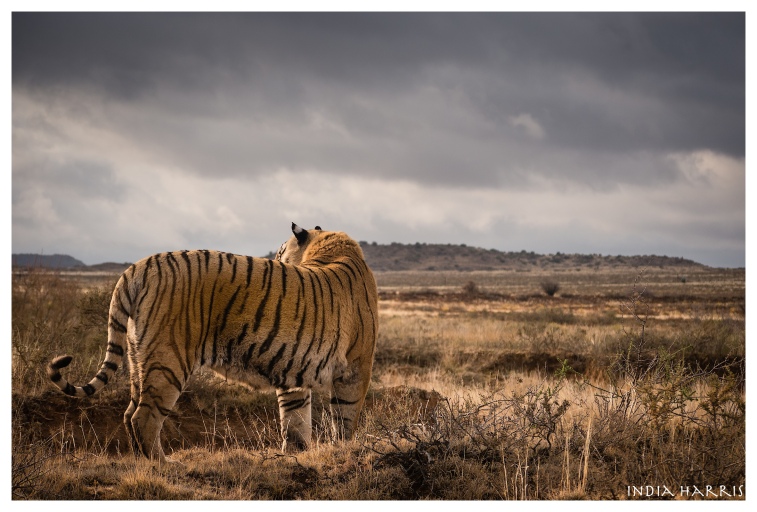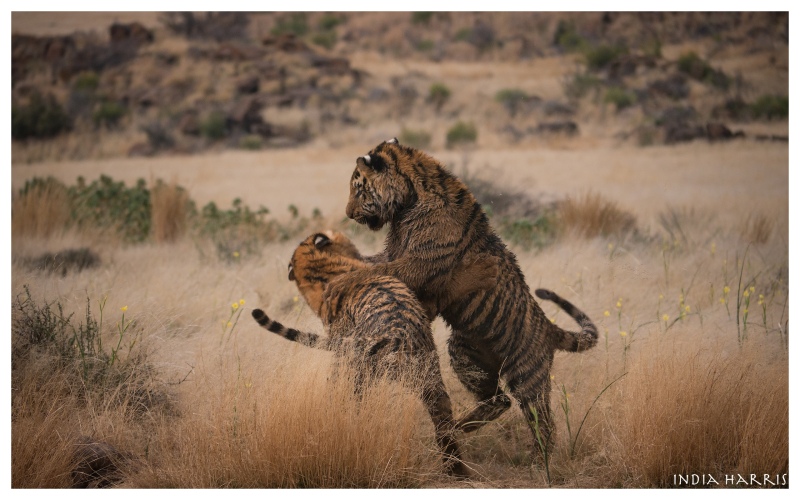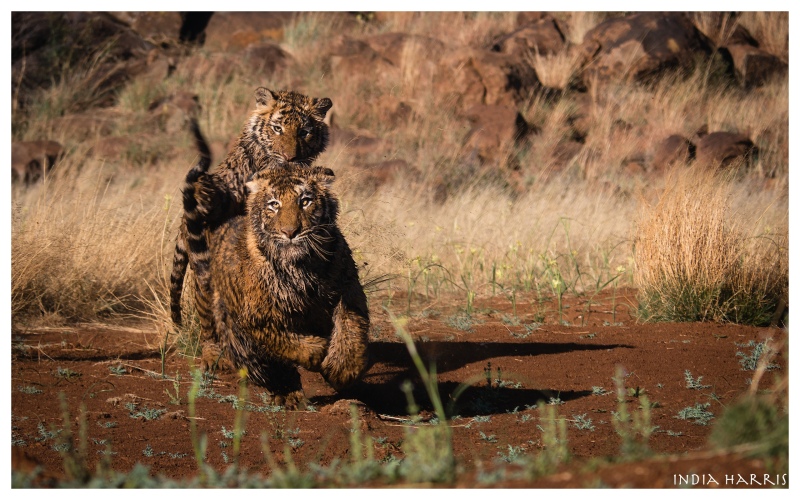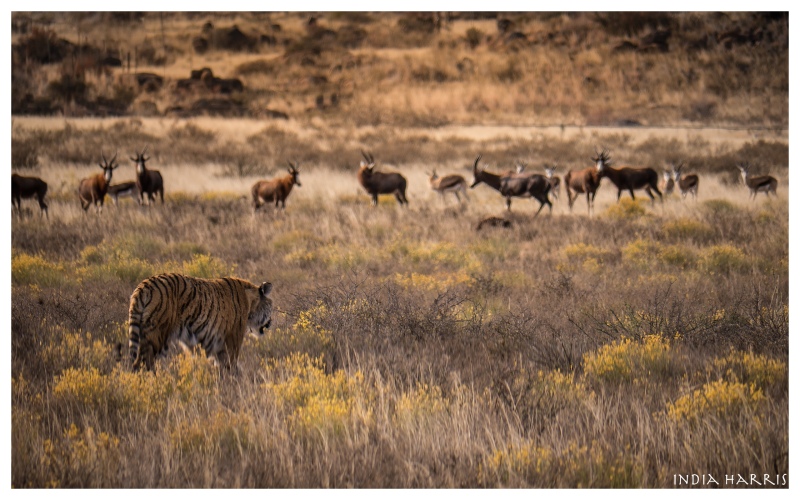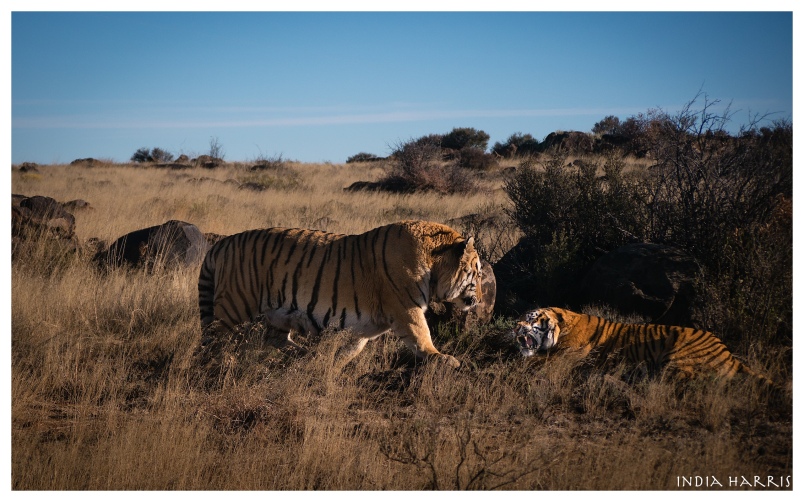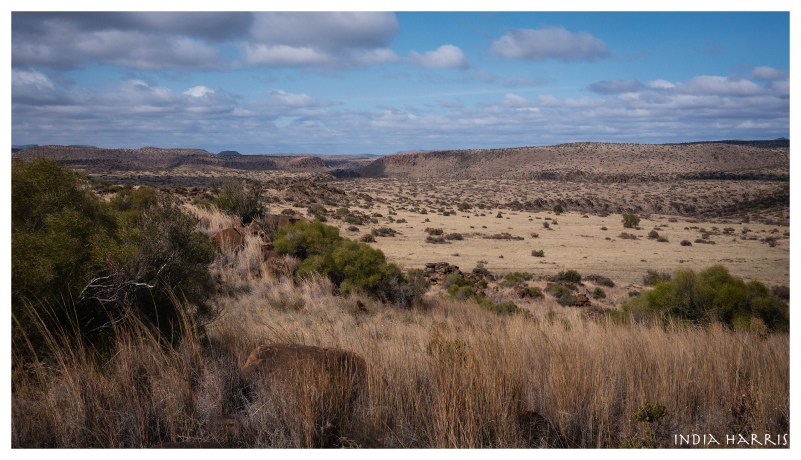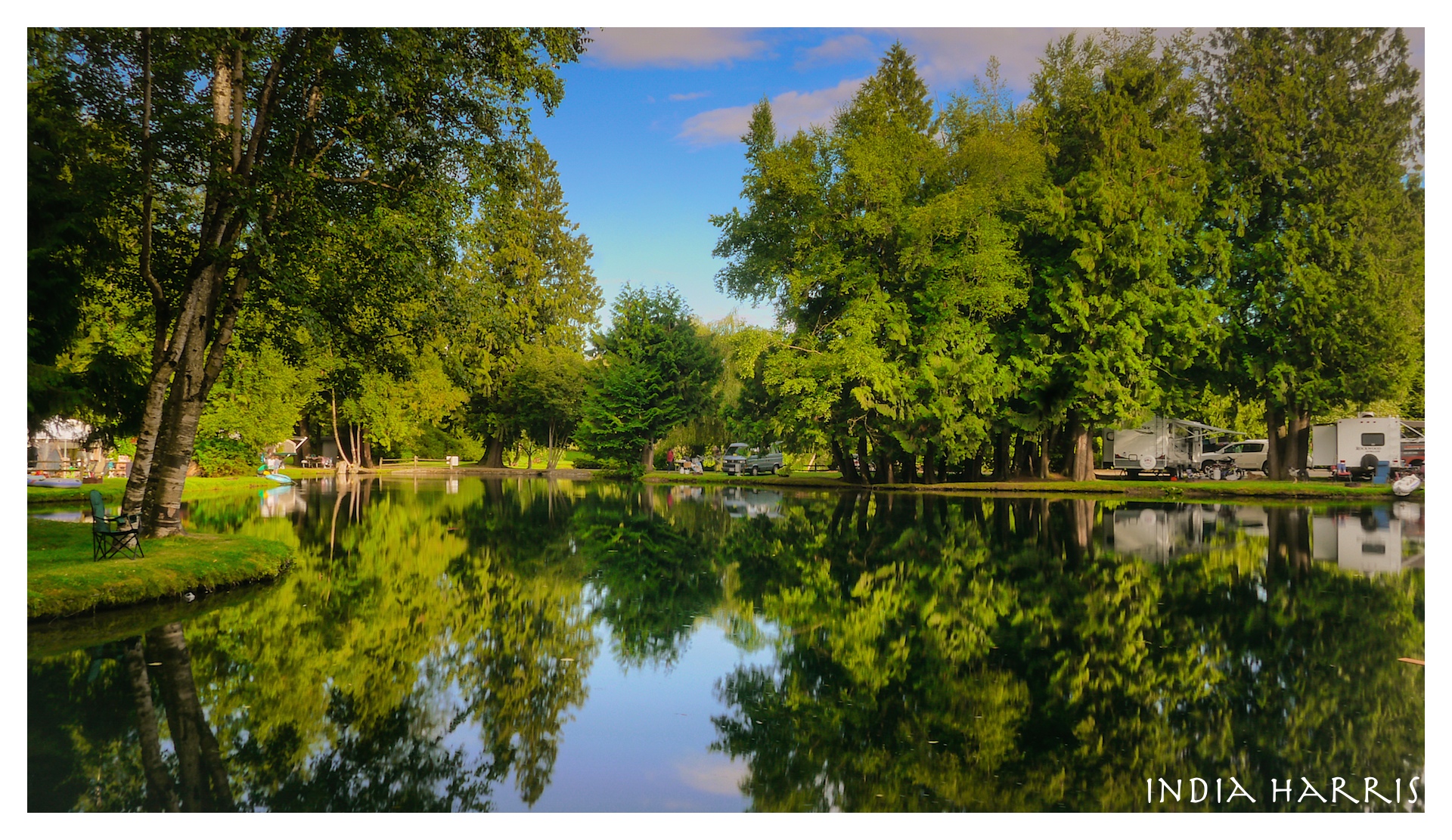
“OH SHIT” might have been the last words ever to come out of my mouth. Not very profound, but a pretty accurate assessment of my situation. According to witnesses, that’s what I shouted when I was charged by a tiger the day before yesterday. Okay, so the tiger was a cub and the charge may have been more of an attempt at a “pounce”, but I admit to having a moment of fear. Baby or not, it’s a tiger!
John Varty has been raising two tiger cubs by hand, with the intention of releasing them into his wild tiger population. The difficulty is that tiger cubs learn to hunt from their mothers. In this case, John Varty must be their mother and painstakingly teach them everything they need to know in order to survive in the wild. If you toss a dead zebra at a tiger cub, it will play with it but not eat it. It doesn’t realize it’s food. Teaching it to make that connection and eventually kill its own food is a very long process.
While at Tiger Canyons I had the unique opportunity to go out “walking” with the two cubs, who receive daily training sessions. They’re getting quite big now and when they play, they play hard.
Tigers love the water and are great swimmers. A dead warthog was placed in a pool of muddy water and when the excited tigers were released from the back of the jeep, it was highly entertaining, believe me.
It was a wonderful experience to watch young tigers discover their own nature. And I discovered a little about mine as well. When a tiger is running straight toward me, I shout “Oh shit!”
Enjoy the photos…
India

Tigers. There aren’t many left in the wild, so for those of us who love to photograph them, there are few alternatives to snapping away at our local zoo. Tigers in zoos are sad creatures, pacing restlessly in cages or sleeping off their boredom. Worldwide, far more tigers live in captivity than in the wild and the future of the wild tiger looks grim indeed.
I’m happy to say that I’ve just finished a three-day tiger photo safari at John Varty’s “Tiger Canyons” in South Africa and here are some of the results. Twenty lucky tigers live in what is surely tiger heaven. They hunt their own food, they have territories which they patrol and mark religiously, they mate and produce litters of cubs — and yes, sometimes they fight. They’re tigers and they’re magnificent. I hope you enjoy the photos…
India.

South African wildlife documentary filmmaker and maverick conservationist John Varty has become famous, not only for his film-making career and work with African Big Cats and Asian tigers, but also for his highly adventurous life. He has survived a helicopter crash and a tiger mauling, and has written a page-turning memoir appropriately titled “Nine Lives”. In 2003, the Discovery Channel made a documentary about him, called “Living with Tigers”, and in 2011, National Geographic produced another, called “Tiger Man of Africa”.
I’ve travelled more than twenty-four hours to reach Johannesburg. Tomorrow I will continue my journey to the Free State and “Tiger Canyons”, where I’ll spend three days photographing tigers with John Varty. This will be my second visit and I’m thrilled to be returning.
John Varty doesn’t just talk the talk. He has been walking the walk of tiger conservation since the year 2000, when he first transported a pair of young Bengal tigers from a Canadian zoo to South Africa, where they were released to freedom at Tiger Canyons, a large and rugged area of land where tigers now roam freely and hunt African prey for their food (the borders of the land are fenced). Tigers are not native to Africa, but John Varty has tenaciously persevered with his controversial project whereby he hopes to raise a self-sustaining wild tiger population outside its native Asia. The ultimate goal is that these tigers may someday be reintroduced into the wild if Asian governments commit themselves to providing safe habitat for this highly endangered animal. In the meantime, John Varty encourages photographers to visit, publish their photos, and hopefully, make the public care about the plight of the tiger.
Since I first read about Tiger Canyons in 2010, I’ve been fascinated by the place and the concept behind it. Tigers in Africa! Tigers are highly adaptable to their environment and have been doing well at Tiger Canyons, successfully hunting and breeding — so, with the right security, raising tigers in Africa seems like a great idea. It’s also potentially a very dangerous idea — the tiger is an apex predator. Should they ever be deliberately or accidentally released into Africa, the outcome would likely be disastrous.
Here are two of my photos from last year’s visit. I’ll be sharing new ones with you at the end of my safari and will hopefully have a tiger story or two to share as well…
India

I want to move to Bali. I’ve come here on holiday three years in a row and it’s absolutely the most perfect place I’ve ever seen. The people are lovely, the scenery is stunning, the food is delicious — I just can’t say enough about this wonderful island. I can’t wait to leave behind the hassles and irritations of life in the Philippines. This could be a new beginning for me, a chance to be truly happy…
A few days ago, I met an American woman who has lived in Bali for four years. Strangely, I saw discontentment in her face — perhaps the worst kind of discontent you can have — the kind that stems from moving halfway around the world to find the life of your dreams, only to discover that you’re no happier in paradise than you were in your hometown.
How is it possible to be unhappy in Bali, I wondered. Isn’t Bali the symbol of earthly paradise? According to the American woman, it’s not. She explained that traffic is a nightmare, there are culture clashes with the Balinese, many of her fellow expats are assholes…
Wow, that sounds a lot like expat life in the Philippines! In fact, her comments have started me thinking about all the miserable expats I know. A huge percentage of expat conversations revolve around the trials and tribulations of living in our adopted countries. Where I live, the daily outpouring of grumbling keeps many a local bar in business. There’s an endless supply of gossip: this guy’s wife (and weren’t we just at their big wedding party a couple of years ago?) just ran off with all his money; that guy’s new baby doesn’t look anything at all like him and didn’t he used to brag that he had a vasectomy twenty years ago? Someone else’s new house has cost him three times the building estimate and it still isn’t finished — apparently, he’s now so broke that he can’t even pay his bar bill. I myself have provided fodder for the gossip hounds: “Did you hear that India’s husband ran off with their maid?” The drama seems endless.
How is it that we can live in such beautiful places and yet find ourselves so miserable? The only answer I can come up with is that happiness either lives or doesn’t live inside each of us, regardless of where we are. If we’re miserable in Chicago, then we’re probably going to be miserable in Bali. Or Tahiti. Or Costa Rica. Likewise, we can meet extraordinarily happy people living in what we might consider the shittiest of places.
Sure, we can give it a try. We can buy that one-way plane ticket and a suitcase full of new clothes. We can arrive on our tropical island, where a fabulous new house awaits us, filled with beautiful new furniture; we can make new, interesting friends — and our lives will feel fresh and exciting — for a while.
Until that horrible day when we notice the first signs of tarnish on our shiny new lives. We argue with our neighbors. Our new lovers disappoint us. Our money has evaporated — where the hell did it all go? To our amazement, we realize that we are experiencing exactly the same kind of problems we had at “home”. We’re shocked. How can this be? We’ve completely started over. Or have we?
The truth is, we arrived in our new country with the same patterns of thinking and behavior that we’ve used our entire lives. We have the same minds we’ve always had. If we habitually think negative, self-destructive thoughts, we’re eventually going to unravel in paradise, just the same way we did back home. If we used to get drunk and punch the guy on the next bar stool at home, we’re going to do it in Bali. If we want our meat and potatoes cooked exactly like they were cooked back home — well, we might as well not plan on being an expat for very long. Yes, of course we can change our ways, but that takes time and effort — not just another change in location.
Like the American woman in Bali, I have moments when I think I cannot possibly stand one more day in the Philippines, days when I really want to move. But I know that those moments pass. How could Bali make me happier than I already am? It can’t and it won’t.
So, I’m choosing stay in the Philippines. As the saying goes, “Wherever I go, there I am”. It really is all in our heads…
India

For eight days I will live without caffeine or meat or alcohol or the internet. This is Day 3 of an eight day yoga and meditation retreat in Bali. I am neither in prison nor in rehab, so I do have the freedom to leave the retreat and order a t-bone steak for lunch if I wish, but I’m choosing to follow the suggested guidelines. Surely I can survive a healthy lifestyle for a week?
Though my muscles are stiff and sore from the unaccustomed yoga postures, my body is happy to be stretched and pushed to its limits. I wish I could say the same for my mind, which has not missed an opportunity to shout out its opinions. “Hey, I didn’t come all this way so I could be tortured”, it has said repeatedly during yoga class. “That hurts! I wasn’t meant to be twisted into a pretzel. You call this a vacation?!”
I’m quickly learning that the real challenge isn’t so much the submission of my body — the challenge is to shut up my doubting, complaining mind.
Overall, I’d say things are going well. I’ve had a few grumpy moments, which are probably due to caffeine withdrawal. But why should I allow something as trivial as a cup of coffee to ruin my day? My mind, of course, has other opinions: “Hey, give me a cup of Starbucks Komodo Dragon Blend coffee, with two heaping spoonfuls of sugar and a big splash of cream, not milk. I want coffee!”
The lack of meat hasn’t bothered me at all, as the vegetarian meals we’re served are surprisingly tasty. Our food is organic and grown locally, and I must say that I feel pretty energetic right now. Lunch is the main meal of the day, while dinner is light — the opposite of the way I normally eat. Last night’s dinner was a delicious pumpkin soup and garlic bread, followed by an evening meditation before bed. It’s really quite pleasant to go to bed with a stomach not stuffed with food and I’m definitely sleeping better than usual. Of course, my mind has something to say about this too: “Do you think anybody’s interested in your bloody pumpkin soup? You might like going to bed hungry, but I don’t. I paid for this trip, in case you’ve forgotten, and you’re feeding me GRANOLA? This isn’t funny.”
Unfortunately, my mind and I are in agreement that sunsets just aren’t the same without a cold beer or a glass of wine in my hand. I tell myself that a cup of herbal tea can be just as enjoyable as a frosty bottle of Bintang beer at the end of a hot tropical day. Sadly, it’s not. And dinner doesn’t feel right without wine, especially in such beautiful surroundings. I’m very pleased, however, that my hands have not shaken and I’ve had no hallucinations, so I take this as an excellent sign that I am not an alcoholic. “Of course you’re not an alcoholic. Listen, why don’t you just slip out and buy a couple of six-packs to hide in your room. Just think how much nicer evenings will be.”
As for the internet rule, you can see that I’ve already broken it. “Oh come on, it’s only a minor infraction. You needed to write a blog post, didn’t you? And on the way to your blog, you briefly checked your email, only looked at Facebook for a few minutes, had a quick peek at your bank balance, checked out the weather forecast for the next few days, had another look at Facebook in case there was a new and exciting post. Totally reasonable stuff. Now you won’t be distracted by wondering if there are any problems on the outside.”
And so I must leave now and carry on the struggle with my mind. I’m feeling a little peckish so may just help myself to another bowl of granola. I’ll let you know how it all works out in the end…
India

I woke up in Bali this morning. Not by accident — I had booked the trip on the internet, clicking here, clicking there, without having any concrete expectations of what those casual clicks would materialize into. But sure enough, there was a smiling driver holding a card with my name on it at the airport at 1:30 in the morning, who reached into a small cooler and presented me with a chilled hand towel and bottle of mineral water, then drove me to a secluded resort where I was led through a lush tropical garden and the scent of night-blooming jasmine to a private villa with its very own swimming pool. (Have I mentioned lately how much I LOVE internet shopping?!) The staff here have suggested many wonderful outings to experience the island during my visit, though I keep thinking, why would I want to leave THIS place? I may just refuse to leave, EVER!
There is something magical about Bali. I’m not talking about its exploding number of holiday resorts or adventure tour operations. I’m certainly not talking about its ancient rice paddies being paved over for new subdivisions for western retirees. Many travelers have rejected Bali’s expanding commercialism and have moved on to newer ports of call. Not me.
When I use the word “magical”, I’m talking about the energy of the land. There is a gentle power on this island that seems to wrap itself around you and make you feel better, just by being here. By being still. By sitting in a pool of water under a sky full of stars, thinking quietly and clearly. Answers come.
When my estranged husband died suddenly last year, it was Bali that called out to me. Even while I was in the midst of filling out forms at the embassy in Manila and tying up all those bureaucratic details that seem to spring up from everywhere when your spouse dies in a country not his own, I kept hearing the tiniest whispers, “Bali. Bali.” I hadn’t been planning to come to Bali at all, but I usually follow whispers when I hear them — and so I came and retreated from the world for a week, grieving and remembering. Healing.
Sometimes it’s important to allow people to be kind to us, which really just amounts to being kind to ourselves. To say, “My body is tired. Please massage it.” To allow another person to see you unclothed, to scrub you and bathe you and cover you with healing lotions and scents. To “baby” us again, like our mothers did so many years ago. To accept a stranger’s smile and when that stranger asks how you are — to smile back and really answer them. In Bali, I find this easy to do. For most of my life I have heard myself say, “No thank you, I can do it myself”, as I rush, rush, rush — ignoring the smiles of strangers. In Bali, I smile and say, “Yes, please. Thank you for your help”.
And so I have come back, for the fourth time, to rest and think. Tomorrow I begin a one-week yoga and meditation retreat, bathed in this island’s healing energy. After that, my life is really going to get busy, but I have no doubt that I will have been fully recharged by the spirit of Bali.
Hopefully, I’ll have some beautiful photos to share with you as well…
India

Q — India, I read in your bio that you spent seven years sailing around the Pacific Ocean on a 31-foot sailboat. That must have been quite an adventure. Do you ever miss the sailing life?
A — Well, there are definitely some things that I miss, like being anchored off a secluded beach in Bora Bora or spending a week at an uninhabited island in Tonga. But overall, I can say that I’m happy to be living on land now. When my husband and I first arrived in the Philippines and decided to rent a house, I was so happy to be away from the sea that I chose to live in the jungle. All I wanted to see were trees and green plants all around me. No water! I stayed in that house for eleven years, until I started feeling a little bit suffocated by the heaviness of the jungle. Now I live on a cliff overlooking the ocean, so that water connection is back in my life.
Q — In your essay, “The Rainiest Season”, you wrote: “… I’ve grown very attached to this beautiful island, its good-natured people, and the thriving garden I created with my own hands — the sensation of earth under my feet an enormous pleasure after seven years of floating on the back of the Pacific Ocean.” Was it difficult living on a boat?
A — Yes! It’s a lot of hard work. But I’m grateful for those years. I have come to realize that the ocean has been the greatest teacher of my life. It has taught me lessons that will carry me through pretty much any situation I can think of.
Q — Such as?
A — The number one lesson: be patient! Storms come and go — and sometimes those storms can be pretty terrible, really frightening. But if you batten down the hatches and just ride them out (and they can last for days) you’re going to survive. And how sweet it is when you see blue skies and sunshine at the end of the long, dark tunnel. The truth is that absolutely nothing stays the same. The weather constantly changes: the wind shifts direction — sometimes it’s with you, sometimes it’s against you and sometimes it disappears altogether. Sometimes the waves tower over the stern of the boat; other times the sea is flat calm. Just wait out the bad times. They pass. That’s a HUGE lesson.
I think the next biggest lesson for me was to learn to enjoy BOTH tides. It’s always ebbing and flowing, just like life. Sometimes happiness pours in, sometimes it leaves for a while. Money comes in and it goes out. Business is great, then it slows down. It’s life’s natural flow. Go with it and learn to enjoy whichever tide you’re in. That’s sometimes tough for me to remember. But I try.
Finally, I would say that my sailing life has taught me to be a little more comfortable with living in uncertainty. We used to pull up the anchor and leave for a new island which would be days or even weeks away. I always hated saying goodbye to land. I was leaving life as I knew it, while the next destination was really only a figment of my imagination, a giant leap of faith. You point yourself in a certain compass direction and hope you get there 23 days later. I mean, we would be literally living in limbo, just a tiny speck on the Pacific Ocean — what if the GPS malfunctioned and we never saw land again? It’s dangerous out there! Boats do disappear. And would the new island be worth the risk? It was impossible to know. But here’s what I learned. The next island was always uniquely different and often more beautiful than the one I had been so sad to leave. And that’s a great lesson for life…
Q — It must be very strange to see no land for days or weeks at a time.
A — The first couple of days were always the hardest. My mind didn’t want to be at sea. It wanted to be grocery shopping or watching TV or emailing — it wanted to be pretty much anywhere except where it was, but by the fourth day things would settle down and my mind would get into a different routine.
When I began offshore sailing I found it very disturbing to be just a dot on the ocean. It felt like we were NOTHING. I could barely stand to look at 360 degrees of empty horizon, oblivion stretched out in all directions. Later on, that changed. After weeks at sea, there was nothing else on the ocean but us. We were EVERYTHING. The boat truly became the center of the universe for me. Odd what goes on in the mind. The longest trip we ever made was from the Marshall Islands to Hawaii — 43 days at sea. If you can believe it, when we finally approached the harbor in Kauai, I didn’t want to return to land. I would have happily turned around and gone back out to sea. To freedom. That was definitely weird.
Q — Any plans to take up sailing again?
A — I really don’t think so. You know, sailors are a superstitious bunch and I always kept track of our sailing stats. I’ve spent exactly 250 nights at sea. I think that’s a good round number and I don’t intend to press my luck any more than that. I’m alive today because the ocean LET me live. Trust me, if the ocean wants you dead, you will be. So, I think I can probably say that I’ve retired now.
Q — Thanks, India. Let’s take a break for now…

They were unlikely brothers: one large Golden mix and a tiny black Chihuahua. But brothers they had become, born the same week of the same month — two puppies living next door to each other, playmates from the start. They joyously romped through their gardens, not caring whose house they ate or slept in — as long as they were together. Time passed and the golden dog grew large and strong, while the Chihuahua remained miniature in comparison. Despite their difference in size, however, the bond they shared never changed.
The golden boy was ours, a wild spirit named Mustang. Fifas was Mustang’s tiny, but highly excitable sidekick. Their lives were idyllic until the day came when boxes were carried out of Fifas’s house. The family was moving. Fifas was carried off to a village many miles away.
Three months passed. Mustang pined. The sparkle faded from his eyes and his body grew thin. He wandered listlessly through the neighborhood, a dog without joy. Then one day I was invited to a lunch party. Fifas’s family was mentioned. Apparently, there were problems with the marriage, someone said. They had relocated again, this time to Manila. I described my dog’s serious depression since Fifas had gone.
“That’s really too bad”, said my friend. “I heard the wife gave Fifas away to the jeepney driver who moved them. No one knows where he is. My gardener was talking to her maid, and that’s what I’ve heard, anyway.”
That poor little dog given away to a complete stranger! I was livid. It was a struggle not to leap up and abandon my friend’s beautiful lunch table so I could begin hunting for Fifas right away. If he was still alive, I would find him. Later that afternoon I questioned every jeepney driver I saw in town. They looked at me like I was the craziest white woman they had ever seen. This wasn’t going to be easy, I realized. He could be anywhere.
Inspiration flashed: we would offer a reward. I spread the word that we would pay a thousand pesos (about $23 — almost four days’ wages for the average Filipino in my area) for the safe delivery of Fifas to our house. “Don’t worry”, people said. “We will find him.”
Days came and went, yet there was no sign of a little black dog. By the end of two weeks, I was discouraged, sitting on my patio on a quiet Sunday evening. Suddenly I heard knocking at the front door. Two Filipino men stood outside, smiling. One held Fifas in his arms.
“We’ve brought your dog, Ma’am”, he said.
And the two brothers have been together ever since…
India

“…in one of the collection’s more potentially divisive essays, privileged expat wife India Harris owns up to being the face of Filipina maid abuse (“Please, ma’am, I need work. My daughter is hungry. I don’t care. That’s your problem”)”
Q – India, I do apologize for beginning our question and answer series by raising this particular subject, but I’m really quite interested in knowing how you feel about this reviewer’s opinion of your story, “The Rainiest Season”. I believe he is a white male living in Shanghai. Have you seen this review?
A — Wow, okay, this is the first question? Really? Because this is not something that I expected to have to talk about, at least not today. Wouldn’t you like to ask something a little more general, like how I ended up living in the Philippines? That would be kind of a nice, easy, warm-up question.
Q — Like I said, I’m sorry to ask about this. But I think spontaneity can be a good thing, wouldn’t you agree?
A — Hmm. I really don’t know how well I’m going to do at this interview thing. I find it difficult to be put on the spot like this. But hey, I’ll give it a go.
Alright, first of all, let me say that I was not happy to read that review. Who would be? The face of Filipina maid abuse? Give me a break!
But here’s the thing. What really surprised me was his ANGER. He sounds genuinely pissed off at me personally, don’t you think? Every time I read that paragraph I imagine his face all twisted up with nasty thoughts about me while he’s banging out those sentences on his keyboard. In fact, the tone of his comment is so aggressive that I started to wonder more about him as a person than his actual comments about my story.
Can you just give me a second to pull up the full book review? I know he says more about women. Hang on…
Okay, here it is. I’m quoting him now:
“Fempat” is a new word that was coined during the controversy surrounding last year’s debut of my own China expat anthology, _______ _________, and while it is wrongly attributed to me, my defining it in media interviews as “those angry, lonely, single female expats in China who are overlooked by western males seeking Chinese girlfriends” only served to secure it in the lexicon of world travel terminology. Unquote.
I’m guessing that this guy doesn’t like white women much. I’ll also hazard a guess that he especially doesn’t like white women who have more money than he does.
Oh, and did I mention that he’s a lying prick? Just joking. Whatever you do, please DO NOT put that in! Seriously. I don’t need trouble.
Let’s change that to I don’t think he is a credible, objective reviewer. Yes, that sounds much better. The quotes he selected from my essay are inflammatory, taken completely out of context, and would bias any potential reader against me. They make me sound like a monster.
Anyone who has actually READ my story knows exactly why I responded to the maid that way. Without spoiling the plot, it should be obvious to the reader from the very first paragraph that my husband is sleeping with our Filipina maid. So that crap about me being the face of Filipina maid abuse is a pure fabrication on his part.
But here’s my philosophy: it is not my job as a writer to make readers like me. True, it’s nice if they do, but it isn’t necessary that everyone love the protagonist of a story. What IS my job is to create a story that keeps the reader wanting to read the next paragraph, to turn the next page, to stay interested in what happens to the main character until the very last page.
And so I must have failed as a writer, because there is no way that the white guy from Shanghai could possibly have read all of “The Rainiest Season” and still have presented those quotes in that biased way. But maybe the book will sell a few more copies because of his comments. And that would be a good thing.
Okay, how was that. Enough?
Q — Thank you, India. Let’s take a break for now.

There are moments when it really irks me to be compared with other versions of myself. Those wishful tricks of the mind that cloud the truth of who I am right now. Am I expected to remain seventeen forever? Or the wife of a man who is no longer alive? A student of history? A sailor? Those versions of myself belong to yesterday. Today is where I want to live.
But maybe I’m guilty of the same offense. Do I not wish the class clown from elementary school to still be funny and happy in middle age? And how could my eyes have failed to see that the years had turned my dog into a frail old lady? Or how about the way I tolerate obnoxious behavior from adults who, once upon a time, were cute kids in my world. Why do we so often choose the illusion of nostalgia over the reality of now? Who knows, maybe remembering “the good old days” prevents us from contemplating other, more unpleasant future events.
I wonder if it’s even possible to shed the past. Perhaps who we are can’t properly be defined, ever. Who, precisely, is the “I” in “I am happy” or “I want chocolate”? All of us are changing, evolving beings, with many different aspects of ourselves packaged up inside often deceptive exteriors. I have been a daughter, granddaughter, stepdaughter, daughter-in-law, sister, stepsister, sister-in-law, cousin, niece, aunt, student, teacher, friend, enemy, lover, bride, widow — but all rolled up together they equal ME. Now. Today.
India




